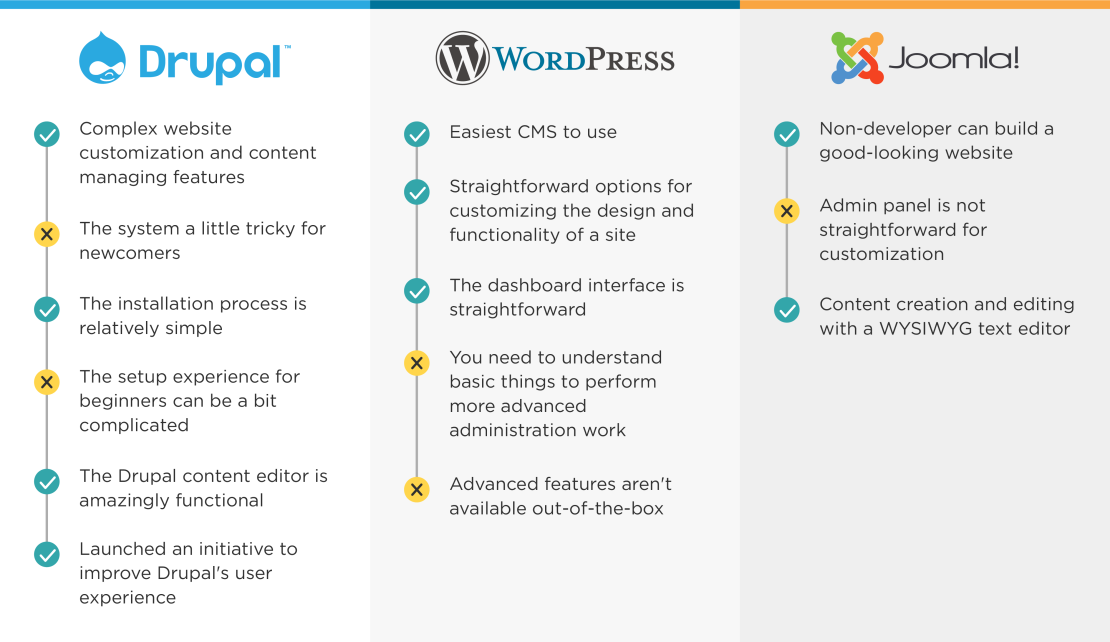WordPress is generally easier for beginners and offers more plugins. Joomla provides greater flexibility for developers and complex sites.
Choosing the right content management system (CMS) is crucial for your website’s success. WordPress and Joomla are two popular options, each with distinct advantages. WordPress dominates the market due to its user-friendly interface and vast plugin library. Joomla, while less popular, excels in customization and flexibility for advanced users.
Both platforms offer robust features, but their suitability depends on your specific needs and technical skills. Understanding the key differences helps in making an informed decision. Whether you are a novice or an experienced developer, knowing what each CMS offers can guide you toward the best choice for your project.
Ease Of Use
Choosing a content management system (CMS) often boils down to ease of use. In 2025, both WordPress and Joomla offer unique experiences. This section will help you understand their differences.
User Interface
WordPress boasts a clean and intuitive interface. The dashboard is straightforward, with all essential options easily accessible. Users can find what they need without much hassle. The menu layout is simple, and it includes features like:
- Post and page management
- Theme customization
- Plugin installation
Joomla, on the other hand, has a more complex interface. It offers many customization options, which can be overwhelming for beginners. The dashboard includes advanced settings, making it more suited for experienced users. Key features of the Joomla interface include:
- Module management
- Advanced user permissions
- Extensive configuration options
Learning Curve
WordPress is known for its easy learning curve. Most users can create a website within a few hours. The platform offers numerous tutorials and a vast community support. Key aspects that simplify learning WordPress include:
- User-friendly interface
- Abundant online resources
- Wide range of plugins
Joomla has a steeper learning curve. It requires more time to master its features. Users need to understand its structure and terminology. While it offers robust capabilities, beginners may find it challenging. Key points about Joomla’s learning curve:
- Detailed documentation
- Active community forums
- Comprehensive tutorials
In summary, WordPress is generally easier to use and learn. Joomla offers powerful features but requires more effort to master.

Customization
Customization is a crucial factor when choosing a CMS. Both WordPress and Joomla offer extensive customization options. Each platform has its strengths and unique offerings.
Themes And Templates
WordPress offers a vast library of themes. Many are free, while others are premium. You can find themes for every niche, from blogs to eCommerce.
Joomla also provides a wide selection of templates. These templates are highly flexible. You can adjust layouts, colors, and fonts with ease.
| Features | WordPress | Joomla |
|---|---|---|
| Number of Options | Thousands of Themes | Hundreds of Templates |
| Ease of Use | Beginner-Friendly | Intermediate |
| Flexibility | Moderate | High |
Plugins And Extensions
WordPress boasts over 50,000 plugins. These plugins cover every function you can imagine. SEO, security, and social media integrations are just a few examples.
Joomla has a rich repository of extensions. These extensions offer robust functionalities. They include everything from eCommerce solutions to advanced user management.
- WordPress Plugins:
- Yoast SEO
- WooCommerce
- Jetpack
- Joomla Extensions:
- VirtueMart
- JCE Editor
- RSForm! Pro
In summary, both platforms excel in customization. WordPress is more user-friendly. Joomla offers greater flexibility and control.
Performance
Performance is crucial for any website. It directly impacts user experience and search engine rankings. Let’s compare WordPress and Joomla in terms of performance in 2025.
Speed And Optimization
Speed is essential for a positive user experience. Both WordPress and Joomla offer various optimization options.
- WordPress: WordPress has numerous plugins for speed optimization. Popular plugins like WP Rocket and W3 Total Cache improve loading times. The platform also supports lazy loading and image optimization.
- Joomla: Joomla also provides tools for speed. Extensions like JCH Optimize and JotCache help in reducing load times. Joomla’s built-in caching system is highly effective.
Both platforms can achieve excellent speeds. Choosing the right tools and configurations is key.
Resource Management
Resource management affects how well your site handles traffic. It involves server load and memory usage.
| Criteria | WordPress | Joomla |
|---|---|---|
| Server Load | WordPress can be resource-heavy without optimization. Proper caching and CDN can reduce load. | Joomla is lightweight by default. It efficiently handles server resources. |
| Memory Usage | WordPress requires more memory as plugins increase. Using optimized themes helps manage memory. | Joomla uses less memory out of the box. Extensions do not heavily impact memory. |
Joomla generally performs better in resource management. WordPress can match it with proper optimization.
Security
Security is a critical aspect to consider when choosing a CMS. Both WordPress and Joomla have unique approaches to security. This section will explore their security features and options.
Built-in Security Features
WordPress and Joomla offer various built-in security features. Let’s look at these features in detail:
| Feature | WordPress | Joomla |
|---|---|---|
| Two-Factor Authentication | Available via plugins | Built-in |
| SSL Support | Yes, with plugins | Yes, native |
| Auto Updates | Core updates automatic | Manual updates |
| Content Encryption | Plugins required | Built-in |
Third-party Security Options
Both platforms support a variety of third-party security options:
- WordPress:
- Wordfence Security
- Sucuri Security
- iThemes Security
- Joomla:
- RSFirewall
- JHackGuard
- Admin Tools
Each CMS has strengths and weaknesses in security. WordPress relies heavily on plugins for advanced security. Joomla offers more built-in security features. Your choice depends on your specific needs.
Seo Capabilities
Choosing the right CMS for your website affects your SEO strategy. Both WordPress and Joomla offer unique SEO capabilities. Let’s dive into their features to see which one suits your needs better in 2025.
On-page Seo
On-page SEO involves optimizing individual pages for better search engine rankings. WordPress excels in this area with its user-friendly interface. You can easily edit meta titles, descriptions, and headers. It also allows for quick image optimization, ensuring all images have alt text.
Joomla also offers robust on-page SEO features. It provides built-in options for editing meta titles and descriptions. You can also set custom URLs for your pages. Additionally, Joomla supports heading tags, making it easy to structure your content effectively.
Seo Plugins And Tools
WordPress boasts a vast array of SEO plugins and tools. Here are some popular ones:
- Yoast SEO: Provides real-time SEO analysis and suggestions.
- All in One SEO Pack: Offers comprehensive SEO features.
- Rank Math: Includes advanced SEO analytics.
These plugins simplify the SEO process, making it accessible even for beginners.
Joomla also has powerful SEO tools, though fewer in number:
- sh404SEF: Creates clean URLs and improves search engine indexing.
- Easy Frontend SEO (EFSEO): Allows easy editing of meta information from the frontend.
- JSitemap: Enhances sitemap management and indexing.
While Joomla’s tools are effective, they require a bit more technical know-how.

Community Support
Community support is crucial for any content management system (CMS). Users often need help, and having a strong community can be a lifesaver. Both WordPress and Joomla have active communities, but how do they compare?
User Forums
WordPress has a vast user base. Its forums are bustling with activity. Users can find answers to almost any question. The forums are well-organized and easy to navigate.
On the other hand, Joomla also has active forums. However, they are less populated than WordPress forums. Despite this, Joomla forums are very helpful. Users share detailed solutions and tips.
| Platform | Forum Activity | User Engagement |
|---|---|---|
| WordPress | High | Very Engaged |
| Joomla | Moderate | Engaged |
Developer Resources
WordPress offers a plethora of developer resources. Their Codex is comprehensive and constantly updated. There are also numerous tutorials and guides available.
Joomla is not far behind. It provides detailed documentation for developers. This includes coding standards, API references, and sample codes.
- WordPress Codex: Extensive and user-friendly.
- Joomla Documentation: Detailed and developer-focused.
Both platforms have strong community support. WordPress has a larger user base. Joomla offers detailed developer resources. Choose based on your specific needs.
Cost
When deciding between WordPress and Joomla in 2025, cost is a crucial factor. Both platforms have different expenses. These include setup and maintenance costs. Understanding these can help you make a better choice.
Initial Setup Costs
Setting up a website involves several costs. Below is a breakdown for both platforms.
| Cost Component | WordPress | Joomla |
|---|---|---|
| Domain Name | $10 – $15 per year | $10 – $15 per year |
| Hosting | $3 – $25 per month | $5 – $30 per month |
| Templates/Themes | $0 – $100 (one-time) | $0 – $70 (one-time) |
| Plugins/Extensions | $0 – $200 (one-time) | $0 – $150 (one-time) |
WordPress offers more free options for themes and plugins. It might be cheaper initially.
Ongoing Maintenance Costs
Maintaining a website requires continuous investment. Below is a comparison for both platforms.
- Hosting: WordPress ($3 – $25 per month), Joomla ($5 – $30 per month)
- Security: WordPress ($50 – $200 per year), Joomla ($50 – $150 per year)
- Updates: Both platforms need regular updates. Costs can vary.
- Support: Premium support can cost $100 – $500 annually for both.
Both platforms require similar ongoing costs. Joomla might be slightly more expensive.

Frequently Asked Questions
Which Is Easier To Use: WordPress Or Joomla?
WordPress is generally easier to use. It has a more intuitive interface. Joomla requires a steeper learning curve. Beginners usually prefer WordPress.
Which Platform Is Better For Seo?
WordPress is better for SEO. It has many plugins dedicated to SEO. Joomla also supports SEO but is less intuitive.
Can I Customize My Site More With Joomla?
Yes, Joomla offers more customization options. It provides greater flexibility for developers. WordPress is also customizable but easier for non-developers.
Which Platform Has Better Security Features?
Joomla is known for robust security features. It offers more built-in security options. WordPress relies heavily on plugins for security.
Conclusion
Choosing between WordPress and Joomla depends on your needs. WordPress offers simplicity and extensive plugins. Joomla provides flexibility and advanced customization. Both platforms have strengths. Evaluate your requirements to make the best decision. Whether you prioritize ease of use or customization, either can help build a successful website in 2025.
